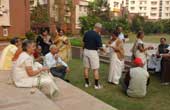 |
| JUST LIKE KIN: Gandhi (third from left) enjoys a cup of tea with his friends. Photo: Subhendu Chaki |
It’s the fear that he remembers most. The year was 2002. And it was a cold, December evening. The night before, 77-year-old M.R. Gandhi, retired electrical engineer of the Fertiliser Corporation of India, had moved with his wife into a plush high-rise complex off the E.M. Bypass. He had gone for a late afternoon walk. The paved lanes within the compound were lined on either side by manicured gardens and parks. And as the sun went down and evening descended, Gandhi felt his spirits sink.
Slowly, everyone else went indoors. But Gandhi didn’t want to go inside. “I felt afraid,” he recollects.
In this new neighbourhood, he knew no one. His children — a son and three daughters — their spouses and their children all lived separately and at this age, alone and ailing, life itself seemed like a long, cold, lonely winter. “The walls of the empty house seemed to close in on me,” he says. “And I was really scared of that feeling. It seemed to numb me totally. The only consolation was that my wife was there, but she too suffered from loneliness and it didn’t help to talk to each other.”
January 2004. It’s six in the early morning, at the centre of the compound. The sun is up and the sky is blue. Gandhi, along with his wife and dozens of others — mostly elderly people over the age of 60 -— are gathered on the sprawling, green lawn. Some are jogging, others stretching, more walking and all of them, without exception, laughing.
“Laughter is the best way to chase away the blues,” smiles Gandhi, sitting in his living room an hour or so later, sipping ginger tea. He reminisces about that cold, wintry evening in December 2002, and relates what transpired between then and now, to change his life forever. And as he talks you notice that the fear that he says froze him that evening a little more than a year ago, seems to have been thawed out by a warmth in his heart.
“I needed to overcome the fear of loneliness before it destroyed me,” says Gandhi, handing you a plate of ginger biscuits. “So I decided to change things.”
Gandhi reasoned that the cause of his loneliness was that he didn’t have his family around him. So he decided to build a family where he lived. “I began to realise the truth in the saying in our ancient scriptures that if you love only your own children, only your own children will love you back. If you love everyone’s children, everyone’s children will love you”.
So he started to smile at strangers in the lift. He began to converse with people his age, asking them about their lives, their children, their interest and the times they had left behind with the years. Soon, he realised he had a circle of friends in the compound. “And they had become like family to me”.
They started making plans together — to meet at odd hours of the day to have tea, read books and listen to music together. They also went for picnics and other outings.
Gradually they formed a club for all the old people of the compound. Soon, the club organised a laughing club, where everyone meets in the morning, as part of the activities of the club. “We began our mornings together,” says Gandhi, “and everyday, we make tacit promises to each other that we would be there for each other in times of need”.
“The word family comes from the Latin word famulus, which means servant,” explains consultant psychiatrist Dr Debashish Ray. “The role of the family is to serve the individual in every possible way and fulfil his emotional, physical and spiritual needs.” Gandhi, explains Dr Ray, in the absence of his immediate family members, created a support system around him, which served the same function as a family, giving him the same fulfilment that an individual assumes from members of his family.
Gandhi’s daughter, who lives in Delhi, says she feels relieved that her parents are now surrounded, by people who love them. “Both my parents have become much more cheerful since they started this club. It makes me feel less anxious now that I know that they are not all alone.”
F. Rahman, (70), a tea scientist based in Siliguri, who is visiting his daughter, Yasmen, in the same compound and who attended a couple of sessions of the club meeting, says he is impressed with Gandhi’s attempt to create a new family around him. He recalls the incident, reported in newspapers, in July 2003, when an 80-year-old gentleman had been driven to suicide by loneliness. “I just wish,” he says, “he and all the aged and lonely people of the world could form families like Mr Gandhi has done”.
By the time you walk out of the gates of the compound, the sun is setting over the highway that stretches along the compound. Gandhi insists on walking you out. “I just want to tell everyone that it’s in your power to change things,” he says.
He is interrupted by a young evening jogger, who has stopped to enquire about his health. “If you are alone, and don’t like it,” he continues, “get out there and make friends. And then you won’t be afraid to go back in.” And then he turns around and does so.










